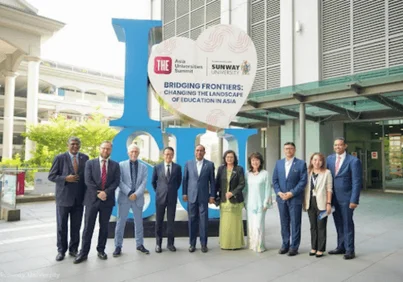
BSc (Hons) Economics

Course overview
| Qualification | Bachelor's Degree |
| Study mode | Full-time |
| Duration | 3 years |
| Intakes | February, June, October |
| Tuition (Local students) | Data not available |
| Tuition (Foreign students) | $ 32,039 |
Admissions
Intakes
Fees
Tuition
- Data not available
- Local students
- $ 32,039
- Foreign students
Estimated cost as reported by the Institution.
Application
- Data not available
- Local students
- Data not available
- Foreign students
Student Visa
- Data not available
- Foreign students
Every effort has been made to ensure that information contained in this website is correct. Changes to any aspects of the programmes may be made from time to time due to unforeseeable circumstances beyond our control and the Institution and EasyUni reserve the right to make amendments to any information contained in this website without prior notice. The Institution and EasyUni accept no liability for any loss or damage arising from any use or misuse of or reliance on any information contained in this website.
Entry Requirements
- 2 A Levels (A-E, 80 UCAS points);
- GSM London’s Foundation Year programme;
- Equivalent qualifications (subject to Plymouth University approval) including: BTEC National Certificate/Diploma, Advanced Level Diploma, HNC/D, Access to HE, IB.
- IELTS minimum score 6.0 or another accepted system, is required.
Curriculum
Semester 1
- Academic Skills: This module serves as an introduction to the core academic skills required of students embarking on undergraduate studies.
- Principles of Economics 1: This module covers the foundation principles of microeconomics and equips students with the foundation knowledge and understanding of economic concepts and principles.
- Principles of Economics 2: This module provides an introduction to the basic concepts and techniques of macroeconomic analysis.
- Interpreting Economic Data: This module considers basic conceptual and practical issues related to the analysis and interpretation of economic data.
Semester 2
- Professional Skills: This module serves as an introduction to the professional skills required of students embarking on undergraduate studies.
- Quantitative Methods: This module develops the mathematical and statistical knowledge and skills needed to understand and solve analytical problems arising in economics.
- Current Economic Issues: This module aims to introduce students to a number of important economic issues that present challenges in the world today.
Semester 3
- Econometrics: This module is a central element in the study of Economics as it introduces the research methods underlying the discipline.
- Employability Skills: This module enables students to develop the knowledge and apply professional skills to achieve employability outcomes.
- Macroeconomic Theory: This module develops the basic concepts and theories of macroeconomic analysis and applies them to the analysis of real world issues in the economy.
- Microeconomic Theory: This module examines the theories and concepts of modern microeconomics and applies them to a range of contemporary issues.
Semester 4
- Public Policy Evaluation: This module covers current and relevant topics in public policy and their theoretical underpinning.
- Economic Applications in Professional Practice: This module focuses on the application of economic theory to research in a practical and professional setting.
Semester 5
- Economics in the International Environment: This module explores the basic concepts and theories in international economics and finance.
- Industrial Organisation: This module develops and explores ideas, past and present on how industry structure formulates decision-making in contemporary firms.
- Research Methods with Economic Modelling: This module introduces essential concepts that are needed for systematic research and applies a range of empirical modelling methods used in economics.
Semester 6
- Emerging Themes and History of Economic Thought: This model identifies and analyses the major contributions in the history of economic thought, starting with the classical economists until the current days.
- Research Economics Project: This module allows students to undertake supervised economic research in an area of significance








